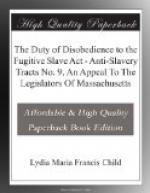If you turn to the favorite New Testament argument, you will find that Paul requested Philemon to receive Onesimus, “no longer as a servant, but as a brother beloved.” Is that the way Southern masters receive the “fugitives from injustice” whom we drive back to them? Is it the way we expect they will be received? In 1851, the intelligent young mechanic, named Thomas Sims, escaped from a hard master, who gave him many blows and no wages. By his own courage and energy, he succeeded in reaching our Commonwealth, where mechanics are not compelled by law to work without wages. But the authorities of Boston decreed that this man was “bound to such service or labor.” So they ordered out their troops and sent him back to his master, who caused him to be tied up and flogged, till the doctor said, “If you strike another blow, you will kill him.” “Let him die,” replied the master. He did nearly die in prison, but recovered to be sold farther South. Was this being received as “a brother beloved”? Before we send back any more Onesimuses, it is necessary to have a different set of Philemons to deal with. The Scripture is clearly not obeyed, under present circumstances.
If you resort to the alleged legal obligation to return fugitives, it has more plausibility, but has it in reality any firm foundation? Americans boast of making their own laws, and of amending them whenever circumstances render it necessary. How, then, can they excuse themselves, or expect the civilized world to excuse them, for making, or sustaining, unjust and cruel laws? The Fugitive Slave Act has none of the attributes of law. If two highwaymen agreed between themselves to stand by each other in robbing helpless men, women and children, should we not find it hard work to “conquer our prejudices” so far as to dignify their bargain with the name of law? That is the light in which the compact between North and South presents itself to the minds of intelligent slaves, and we should view it in the same way, if we were in their position. Law was established to maintain justice between man and man; and this Act clearly maintains injustice. Law was instituted to protect the weak from the strong; this Act delivers the weak completely into the arbitrary power of the strong, “Law is a rule of conduct, prescribed by the supreme power, commanding what is right, and forbidding what is wrong.” This is the commonly received definition of law, and obviously, none more correct could be substituted for it.




